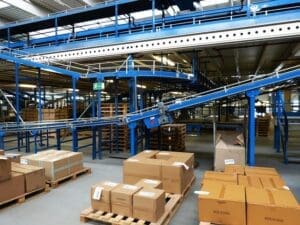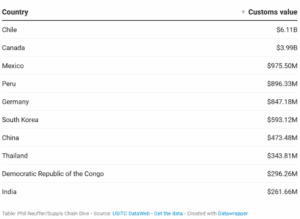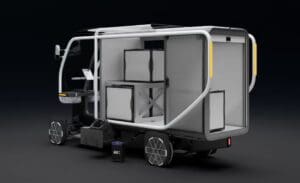 This week in supply chain and logistics news began with the Trump administration imposing a 50% tariff on all U.S. imports of copper. Additionally, Trump ordered a Section 301 investigation into Brazil, which allows the U.S. to take action against countries that violate trade agreements. Infios and S&S Activewear were awarded the “Top Supply Chain Project Winner” for their collaboration on warehouse automation and robotics. Lastly, Mark Morgan, an executive at Kinaxis, discussed Supply Orchestration to mitigate the impacts of tariffs.
This week in supply chain and logistics news began with the Trump administration imposing a 50% tariff on all U.S. imports of copper. Additionally, Trump ordered a Section 301 investigation into Brazil, which allows the U.S. to take action against countries that violate trade agreements. Infios and S&S Activewear were awarded the “Top Supply Chain Project Winner” for their collaboration on warehouse automation and robotics. Lastly, Mark Morgan, an executive at Kinaxis, discussed Supply Orchestration to mitigate the impacts of tariffs.
Here are the biggest stories of the week:
U.S. Places a 50% Tariff on Copper Imports
 The U.S. will impose a 50% tariff on copper imports starting August 1, 2025, following a national security assessment. President Donald Trump announced the decision, which follows a Section 232 investigation into copper imports. This investigation assessed domestic demand, production, and the impact of imports on national security. The new tariffs are expected to increase costs for imported metals, contributing to cost-push inflation. Major copper exporters to the U.S. include Chile and Canada, which together supplied over $10 billion worth of copper in 2024. This move mirrors previous tariffs on steel imports under similar investigations.
The U.S. will impose a 50% tariff on copper imports starting August 1, 2025, following a national security assessment. President Donald Trump announced the decision, which follows a Section 232 investigation into copper imports. This investigation assessed domestic demand, production, and the impact of imports on national security. The new tariffs are expected to increase costs for imported metals, contributing to cost-push inflation. Major copper exporters to the U.S. include Chile and Canada, which together supplied over $10 billion worth of copper in 2024. This move mirrors previous tariffs on steel imports under similar investigations.
Trump Orders Section 301 Investigation on Brazil
 President Donald Trump announced a Section 301 investigation into Brazil due to its digital trade policies, which allegedly restrict U.S.-based social media platforms. He also declared a 50% tariff on Brazilian imports starting August 1, 2025. This move is part of a broader strategy involving reciprocal tariffs on multiple countries, including Japan and South Korea. Brazil, previously facing a 10% baseline tariff, will now see increased tariffs, especially on steel imports. Additionally, Trump threatened a 10% tariff on countries aligned with BRICS. A Section 301 investigation is a tool used by the United States Trade Representative (USTR) to address unfair trade practices by foreign countries. Authorized under the Trade Act of 1974, it allows the U.S. to take action, including imposing tariffs, against countries that violate trade agreements or engage in unjustified, unreasonable, or discriminatory practices that burden U.S. commerce.
President Donald Trump announced a Section 301 investigation into Brazil due to its digital trade policies, which allegedly restrict U.S.-based social media platforms. He also declared a 50% tariff on Brazilian imports starting August 1, 2025. This move is part of a broader strategy involving reciprocal tariffs on multiple countries, including Japan and South Korea. Brazil, previously facing a 10% baseline tariff, will now see increased tariffs, especially on steel imports. Additionally, Trump threatened a 10% tariff on countries aligned with BRICS. A Section 301 investigation is a tool used by the United States Trade Representative (USTR) to address unfair trade practices by foreign countries. Authorized under the Trade Act of 1974, it allows the U.S. to take action, including imposing tariffs, against countries that violate trade agreements or engage in unjustified, unreasonable, or discriminatory practices that burden U.S. commerce.
Honda Launches Quadricycle-based Urban Cargo Delivery Business
 Honda has launched a new business unit called **Fastport**, which aims to revolutionize last-mile delivery in urban areas using electric quadricycles. These modular vehicles, designed for bike lanes, will be produced in Ohio and feature swappable batteries, proximity sensors, and other safety features. Fastport’s “fleet-as-a-service” model includes not just the vehicles but also the entire support ecosystem, including maintenance and software. Honda is targeting parcel and food delivery markets in North America and Europe, with plans to collaborate with major logistics companies for pilot programs. This initiative is part of Honda’s broader strategy to reduce emissions and traffic congestion in cities.
Honda has launched a new business unit called **Fastport**, which aims to revolutionize last-mile delivery in urban areas using electric quadricycles. These modular vehicles, designed for bike lanes, will be produced in Ohio and feature swappable batteries, proximity sensors, and other safety features. Fastport’s “fleet-as-a-service” model includes not just the vehicles but also the entire support ecosystem, including maintenance and software. Honda is targeting parcel and food delivery markets in North America and Europe, with plans to collaborate with major logistics companies for pilot programs. This initiative is part of Honda’s broader strategy to reduce emissions and traffic congestion in cities.
Infios and S&S Activewear Named a 2025 “Top Supply Chain Project Winner”
 S&S Activewear has revolutionized its supply chain by implementing Autonomous Mobile Robots (AMRs) and modernizing 200,000 square feet of warehouse space. This transformation has drastically reduced employee training time from 90 days to just 20 minutes and increased productivity fivefold, achieving 200 picks per hour without additional headcount. The innovative approach has also led to a 75% drop in employee turnover and a 275% increase in accuracy. These advancements earned S&S Activewear the 2025 “Top Supply Chain Projects” Award from Supply and Demand Chain Executive, showcasing their commitment to empowering employees and scaling operations through cutting-edge automation.
S&S Activewear has revolutionized its supply chain by implementing Autonomous Mobile Robots (AMRs) and modernizing 200,000 square feet of warehouse space. This transformation has drastically reduced employee training time from 90 days to just 20 minutes and increased productivity fivefold, achieving 200 picks per hour without additional headcount. The innovative approach has also led to a 75% drop in employee turnover and a 275% increase in accuracy. These advancements earned S&S Activewear the 2025 “Top Supply Chain Projects” Award from Supply and Demand Chain Executive, showcasing their commitment to empowering employees and scaling operations through cutting-edge automation.
Tariffs Are the New Normal: Boardrooms are Finally Demanding a Pivot to Real-Time Supply Chain Orchestration
 In today’s volatile environment, where disruptions like tariffs, labor strikes, and geopolitical instability are common, I recognize the critical need for real-time supply chain orchestration. By leveraging AI-powered orchestration platforms, I can make faster, more informed decisions by simulating scenarios and evaluating trade-offs in real time. This shift from reactive to proactive management helps me protect margins and maintain agility. I understand that resilience is now a boardroom imperative, and I am investing in AI to turn disruptions into competitive advantages.
In today’s volatile environment, where disruptions like tariffs, labor strikes, and geopolitical instability are common, I recognize the critical need for real-time supply chain orchestration. By leveraging AI-powered orchestration platforms, I can make faster, more informed decisions by simulating scenarios and evaluating trade-offs in real time. This shift from reactive to proactive management helps me protect margins and maintain agility. I understand that resilience is now a boardroom imperative, and I am investing in AI to turn disruptions into competitive advantages.
















